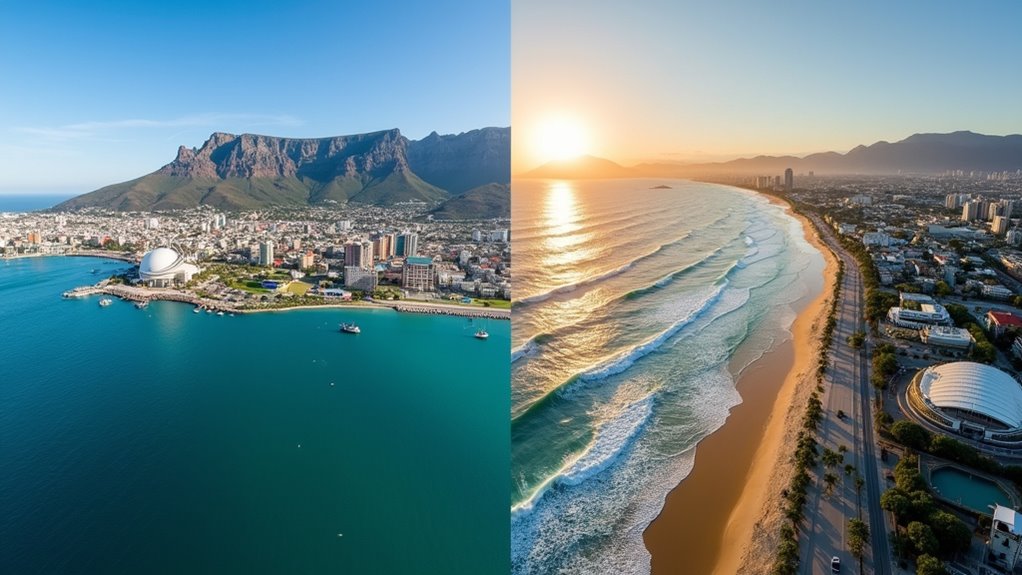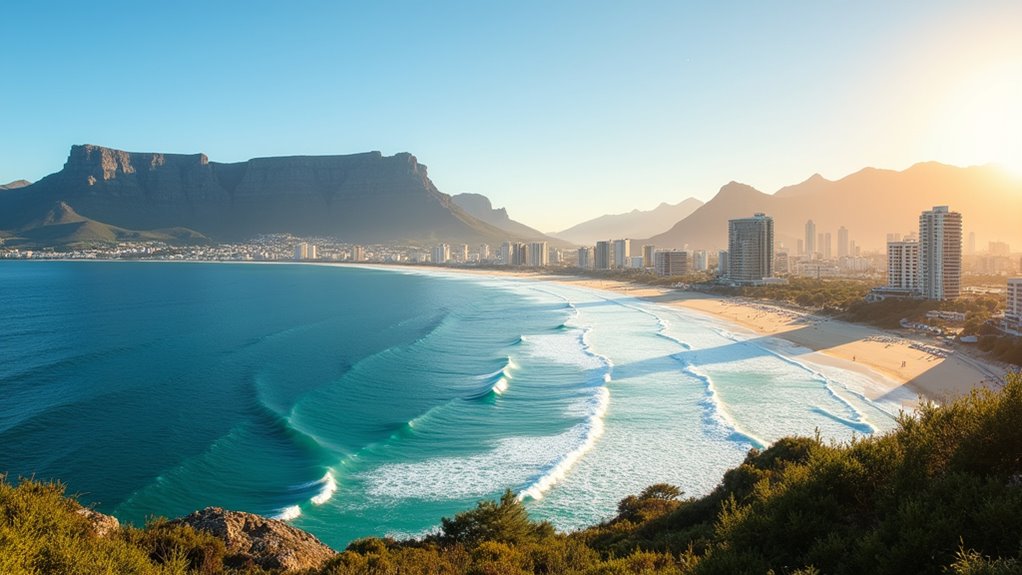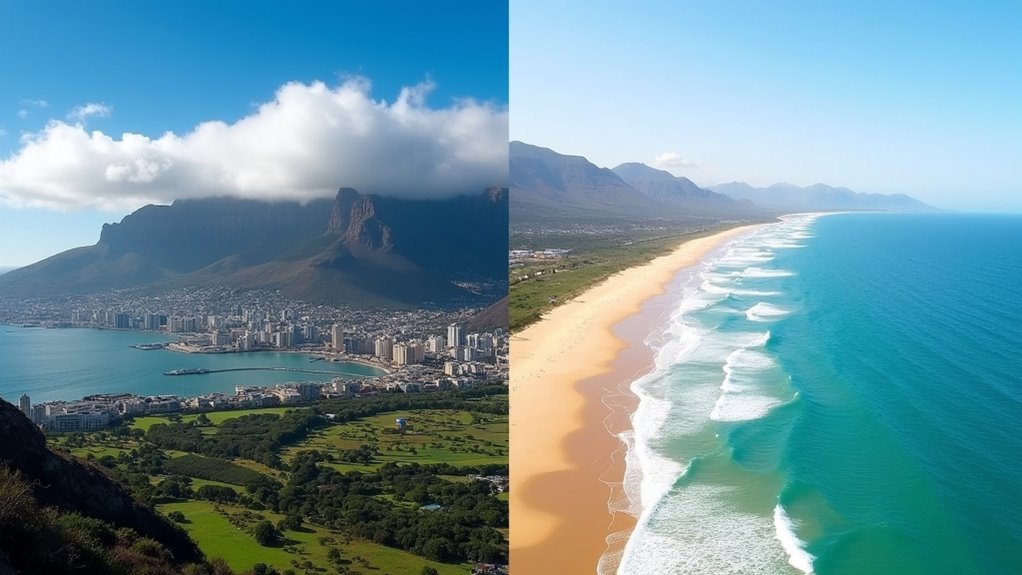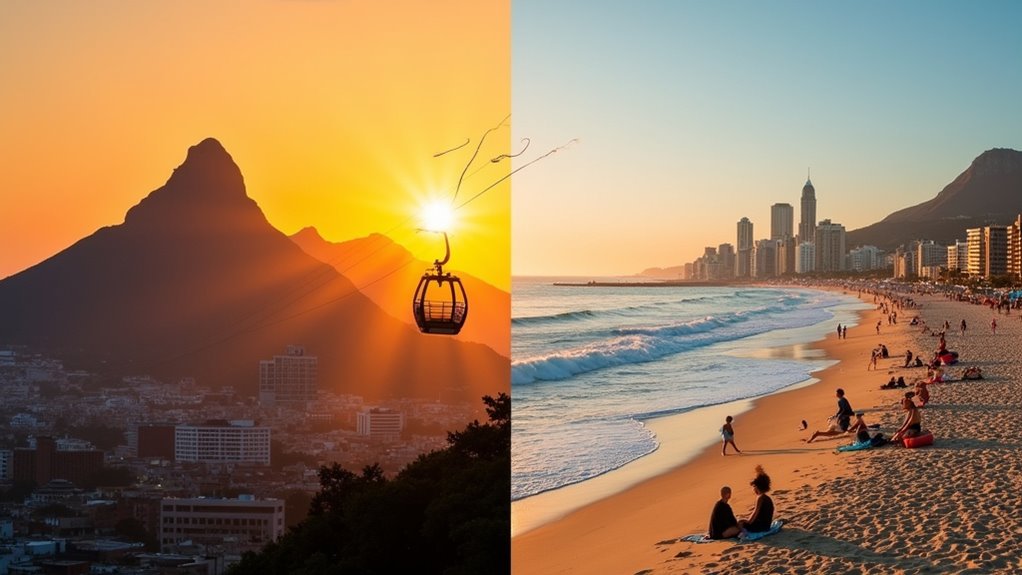Physical Address
304 North Cardinal St.
Dorchester Center, MA 02124
Physical Address
304 North Cardinal St.
Dorchester Center, MA 02124

Wondering which South African gem to explore? Cape Town's dramatic mountains or Durban's warm beaches await your decision.
Cape Town and Durban offer distinctly different South African experiences. You’ll find Cape Town’s dramatic landscapes with Table Mountain and Mediterranean climate contrasting with Durban’s warm beaches and subtropical setting. Cape Town boasts world-class infrastructure but higher prices, while Durban delivers better affordability and year-round swimming. Safety concerns exist in both cities, requiring similar precautions. Your preference between natural wonders or warm-water beaches might guide your ultimate choice.

When it comes to natural beauty, Cape Town and Durban offer distinctly different but equally enchanting landscapes.
Cape Town dazzles with its iconic Table Mountain, a UNESCO World Heritage site providing panoramic views across city and ocean. The Cape Peninsula offers dramatic coastal drives to Cape Point, while the Cape Floral Kingdom boasts 9,000+ plant species in the unique fynbos biome. The Boulders Beach penguin colony provides a unique wildlife experience right within the city limits. Port Louis, the capital of Mauritius, is also renowned for its natural beauty and attractions, making it a worthwhile destination to visit.
Durban counters with lush subtropical scenery, particularly the Valley of a Thousand Hills with its rolling green landscapes. The nearby Drakensberg Range provides dramatic mountain day trips, while Krantzkloof Nature Reserve features forested gorges and waterfalls.
Each city’s natural appeal reflects its geographic position—Cape Town with rugged Atlantic magnificence, Durban with Indian Ocean warmth and verdant inland wilderness.
Despite being coastal cities in the same country, Cape Town and Durban offer dramatically different beach experiences that reflect their geographic positions.
In Durban, you’ll enjoy warm Indian Ocean waters perfect for swimming and surfing. The golden sands of North and South Beach form the vibrant Golden Mile, while Umhlanga Rocks provides family-friendly facilities and fascinating rock pools. Ballito Beach on the Dolphin Coast offers wonderful outdoor activities. Durban’s beaches benefit from a tropical climate that ensures comfortable swimming conditions year-round.
Cape Town’s Atlantic beaches feature stunning white sand and spectacular views, but with considerably colder water. Clifton Beaches attract trendy crowds with their sheltered position, though parking challenges might require taxi transportation. These beaches are better suited for sunbathing and scenery appreciation than swimming.
Your preference for active water sports or scenic relaxation may determine which coastal experience you’ll enjoy more.

The climate differences between Cape Town and Durban shape not only their beaches but also when you’ll need to visit each city. Cape Town embraces a Mediterranean climate with dry summers and wet winters, while Durban offers subtropical weather with humid summers and mild winters.
You’ll find Cape Town most pleasant during spring (September-November) and autumn (March-May), perfect for outdoor activities without summer crowds. Winter brings rain but temperatures rarely drop below 10°C.
In contrast, Durban remains a year-round destination. Even winter days are warm enough for t-shirts, though you’ll encounter thunderstorms during the humid summer months. This is when tourism peaks despite the rainfall. The average temperature difference between the two cities reaches nearly 5°C in July, with Durban consistently warmer throughout the year.
Your preference for outdoor activities and tolerance for heat or rainfall should guide your timing for visiting these climatically diverse cities.
Safety concerns play a significant role in your decision between Cape Town and Durban, as both cities face considerable crime challenges. Cape Town ranks as 32.45% safer than Durban, though both register “very high” crime rates that have been increasing. Durban has a crime index of 80.8 index, placing it among the top 5 most crime-ridden cities in the world for 2025.
Cape Town offers better infrastructure, with a well-developed public transport system including MyCiTi buses and reliable Uber services. Durban’s public transit is less all-encompassing, relying on metered taxis and the People Mover. Alexandria and Hurghada in Egypt offer contrasting experiences, with Alexandria’s urban history and Hurghada’s shimmering beaches.
Both cities provide robust tourist support with information centers, accredited tour operators, and emergency services.
For safety, choose accommodations with security measures in lower-crime areas like Cape Town’s Waterfront and Camps Bay or Durban’s Umhlanga.
Always remain vigilant, avoid displaying valuables, and use only licensed transportation services.

When planning a South African getaway, your budget substantially influences which city offers better value. Durban consistently ranks as the more affordable option, with an overall cost of living 8-12% lower than Cape Town.
Your money stretches further in Durban across several categories:
While transportation costs slightly favor Cape Town, Durban’s overall affordability makes it the budget-friendly choice for travelers watching their expenses. However, Morocco and Egypt offer different cultural experiences that may be more appealing to some visitors.
Beyond budget considerations, South African cities offer dramatically different cultural landscapes that shape your travel experience. In Durban, you’ll encounter Africa’s largest Indian community outside India, creating a fascinating blend with the significant Zulu population. This diversity manifests in the city’s spicy Bunny Chow, vibrant Victoria Street Market, and colorful Diwali celebrations. Egypt’s rich food culture offers a fascinating contrast to explore as well.
Cape Town presents a contrasting multicultural tapestry with its Afrikaans, English, Xhosa, and Cape Malay influences. You’ll discover this heritage through the Bo-Kaap neighborhood‘s colorful houses, the poignant Robben Island prison, and distinctive Cape Malay cuisine like bobotie. The city exemplifies South Africa’s commitment to cultural preservation efforts while embracing modern global influences.
Both cities showcase their complex histories through excellent museums—Durban’s KwaMuhle Museum explores apartheid’s impact, while Cape Town’s District Six Museum documents forced removals. Whichever you choose, you’ll experience authentic South African culture.
Whether you choose Cape Town’s dramatic mountain backdrop or Durban’s golden shores, you’ll find South Africa has more treasures than a pirate’s chest. Cape Town offers iconic landmarks and wine country, while Durban delivers warm waters and opulent Indian influence. Consider your budget, preferred climate, and cultural interests when deciding. Both cities showcase South Africa’s incredible diversity—your perfect match depends on what adventure calls your name loudest.